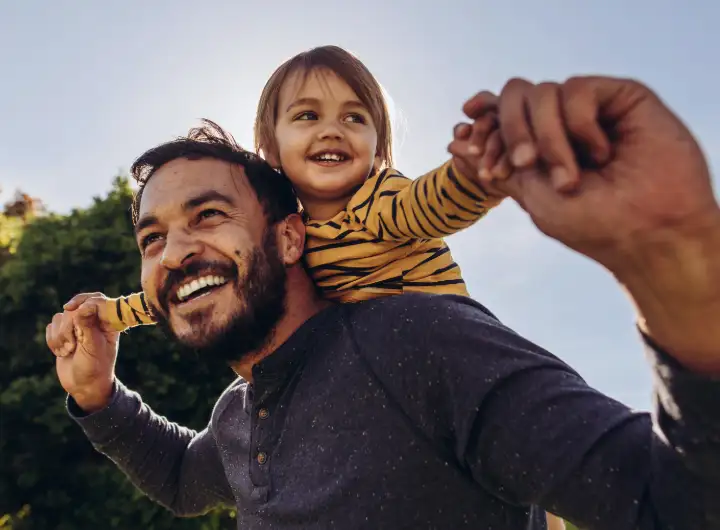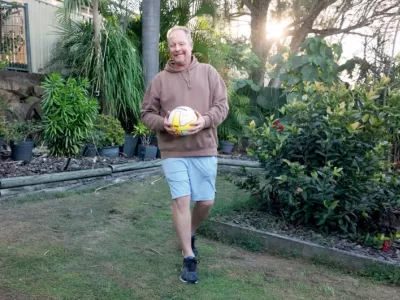Supporting Aussie dads’ mental health for strong family futures

This Men’s Health Week (9-15 June) global parenting advocates and Triple P parents are urging dads, stepdads, grandfathers, father figures, and all parents to take a moment to focus on their mental health and wellbeing – not just for themselves, but the whole family.
Dr Alan Ralph Head of Training and Clinical Psychologist at the Triple P – Positive Parenting Program said that during a man’s lifetime, almost 1 in 2 will experience a mental health disorder and close to 1 in 5 men will experience an anxiety disorder, so it’s a timely reminder to check-in with yourself and those around you.
“Sadly, suicide remains a leading cause of death for men under 55 in Australia, yet they are the least likely to seek help,” Dr Ralph said.
“While parents may find it challenging to ask for or access help with their wellbeing, it’s important to recognise that by looking after yourself as a parent, you’re putting yourself in a better position to be calmer, better connected, and more confident in your ability to positively parent - positively impacting on your child’s health and wellbeing as well,” he said.
Triple P is encouraging men to reach out to a mate or their go-to online community to ease the stress.
“No matter what stage of the parenting journey you’re at, or the make-up of your family, you’re not alone, and you don’t have to bear the load in silence,” says Alan. “Creating a community of support among parents and carers can help reduce isolation and build stronger families.”
“By being open about your struggles and accessing help, parents and carers can create a positive and loving home environment that strengthens children’s emotional resilience and gives them the best start in life,” he said.
Brisbane dad of three teenage boys, Matthew Patten, knows firsthand about the mental health benefits of seeking support and looking after yourself as a parent to help build healthy, happy kids.
“Juggling life, working as a teacher, and being a solo parent has made me see the importance of not being too hard on yourself as a parent and looking after your mental health and wellbeing,” Matt said.
“Being a part of a supportive community like a sporting club, for example, has been a valuable source of help. Being able to talk with people makes a difference. I’m trying to instil that in my boys, to be a willing ear to listen to other people’s concerns but also be open to sharing your own as a release for what you’re feeling.”
“Being open and honest with my kids about my own emotions and how I am feeling has helped my kids to be confident in sharing when they may be worried or anxious about something.”
“Take advantage of the available support. Triple P’s programs are a great starting point if you need a little help as a parent, and it helped me to talk about emotions and wellbeing with my kids,” Matt said.
Triple P parenting tips to help build connection and care for yourself and your family:
- Check-in with yourself. Parents often put pressure on themselves to ‘hold it all together’. Acknowledge any stress or low moods and don’t ignore warning signs. Small changes, like making some regular time for yourself, staying active, or connecting with friends, can help prevent stress from building up.
- Talk it out. Whether it’s with a friend, a loved one, Lifeline, or a health professional, sharing what’s going on in your life is a positive way to manage stress.
- Make time for connection. Small moments of time connecting with your family each day can have a huge impact. When your kids want to share something with you, whether it's a story, a problem, or something they're just curious or excited about, tuning in and really listening sends the message that they’re loved and important.
- Model healthy habits. Model the kind of positive health and wellbeing behaviours you want to see in your kids. This includes having a balanced, healthy lifestyle with plenty of sleep, physical activity, healthy food and a positive approach to mental health.
If you’re struggling with your mental health, contact your doctor, health professional or a support line like Lifeline on 13 11 14.
Thanks to Australian Government funding, more than half a million families in Australia have accessed Triple P’s free parenting support. The feedback from families who have used Triple P’s online programs is overwhelmingly positive - they feel calmer, more confident, and better supported in understanding their children's needs.

